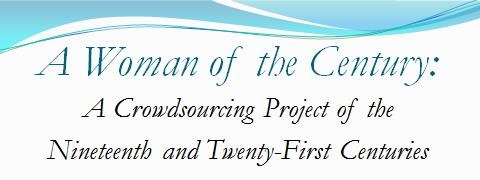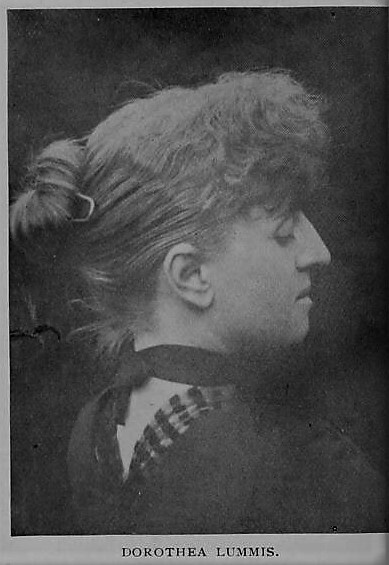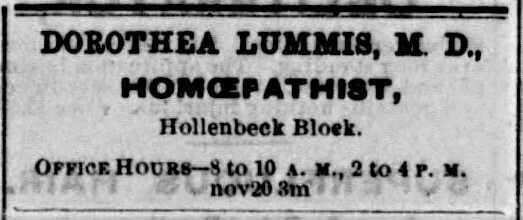Dublin Core
Title
Description
Dorothea, whose birth name was Mary Dorothea Rhodes, was born on November 9, 1857, in Chillicothe, Ohio. After moving to Portsmouth, Ohio, and attending Portsmouth Female College at the age of sixteen, Dorothea, sometimes called Dolly, pursued her passion for music. Like Annie Fillmore Sheardown, Dorothea studied with Philadelphia's Emma Seiler, moving to that city to attend Seiler's Conservatory of Music.
Eventually, Dorothea moved to Boston to study with James O'Neil, who was affiliated with the New England Conservatory of Music. On September 9, 1880, Dorothea married Charles Fletcher Lummis, a young poet who had attended Harvard. Soon after, in 1881, she switched gears and decided to become a physician. Dorothea began studying at the Boston University School of Medicine, which had been founded in 1873.
After she graduated, Dorothea followed her husband to Los Angeles. In late November of 1884, she began advertising her services as a homeopathist in the city's new Hollenbeck Block. As Dorothea established her practice and her social network, she became affiliated with various philanthropic and professional organizations. In 1885, she was one of the first members of the Flower Festival Society, a group of women determined to build a Woman's Home in Los Angeles. Early in 1887, she was elected president of the Homeopathic Society of Los Angeles.
By 1890, Dorothea was a member of the Los Angeles Kennel Club, sometimes showing Amado, her mastiff. During the next year, when she and Charles divorced, Dorothea found time to pursue other passions. She contributed poems to Puck and became a member of the "S.M." Club of Los Angeles vocalists and musicians. In 1892, Dorothea was elected as one of the officers of the Friday Morning Club. Her love for her mastiff became part of her literary work in 1894, when Dorothea published the short story "Amado" in the Chicago Inter-Ocean. During her lifetime, she contributed to numerous periodicals.
In addition to her practice and her writing career, Dorothea took a serious interest in helping people in need. On August 18, 1895, the Los Angeles Herald published Dorothea's lengthy article "Caring for the Outcasts." She spent time in Chicago at Jane Addams's Hull House and later wrote an article about the settlement house which was published in the American Journal of Sociology in March of 1897. While there, she also came to know Earnest Carroll Moore, who became her second husband.
During the twentieth century, Dorothea continued her practice and was an active member of the California Club and the Friday Morning Club. Both Dorothea and Earnest spoke at the Friday Morning Club in June of 1910. They were guests of honor because Earnest had accepted a position at Yale, so the Moores were moving to New Haven.
Once she was in Connecticut, Dorothea took an active role promoting women's rights. She and Earnest both supported the idea of a woman president for a new women's college in that state. In March of 1913, she was a speaker at the Connecticut Woman Suffrage Association's referendum in Hartford. The next year, she took a vacation, sailing to the Mediterranean on the Fabra steamship liner Roma. By that time, Earnest's affiliation had changed to Harvard, so Dorothea had moved to Cambridge.
By 1920, the Moores were back in Los Angeles, where Earnest was a leader at UCLA. Dorothea passed away on March 4, 1942, and was buried in Forest Lawn Memorial Park in Glendale, California.
Eventually, Dorothea moved to Boston to study with James O'Neil, who was affiliated with the New England Conservatory of Music. On September 9, 1880, Dorothea married Charles Fletcher Lummis, a young poet who had attended Harvard. Soon after, in 1881, she switched gears and decided to become a physician. Dorothea began studying at the Boston University School of Medicine, which had been founded in 1873.
After she graduated, Dorothea followed her husband to Los Angeles. In late November of 1884, she began advertising her services as a homeopathist in the city's new Hollenbeck Block. As Dorothea established her practice and her social network, she became affiliated with various philanthropic and professional organizations. In 1885, she was one of the first members of the Flower Festival Society, a group of women determined to build a Woman's Home in Los Angeles. Early in 1887, she was elected president of the Homeopathic Society of Los Angeles.
By 1890, Dorothea was a member of the Los Angeles Kennel Club, sometimes showing Amado, her mastiff. During the next year, when she and Charles divorced, Dorothea found time to pursue other passions. She contributed poems to Puck and became a member of the "S.M." Club of Los Angeles vocalists and musicians. In 1892, Dorothea was elected as one of the officers of the Friday Morning Club. Her love for her mastiff became part of her literary work in 1894, when Dorothea published the short story "Amado" in the Chicago Inter-Ocean. During her lifetime, she contributed to numerous periodicals.
In addition to her practice and her writing career, Dorothea took a serious interest in helping people in need. On August 18, 1895, the Los Angeles Herald published Dorothea's lengthy article "Caring for the Outcasts." She spent time in Chicago at Jane Addams's Hull House and later wrote an article about the settlement house which was published in the American Journal of Sociology in March of 1897. While there, she also came to know Earnest Carroll Moore, who became her second husband.
During the twentieth century, Dorothea continued her practice and was an active member of the California Club and the Friday Morning Club. Both Dorothea and Earnest spoke at the Friday Morning Club in June of 1910. They were guests of honor because Earnest had accepted a position at Yale, so the Moores were moving to New Haven.
Once she was in Connecticut, Dorothea took an active role promoting women's rights. She and Earnest both supported the idea of a woman president for a new women's college in that state. In March of 1913, she was a speaker at the Connecticut Woman Suffrage Association's referendum in Hartford. The next year, she took a vacation, sailing to the Mediterranean on the Fabra steamship liner Roma. By that time, Earnest's affiliation had changed to Harvard, so Dorothea had moved to Cambridge.
By 1920, the Moores were back in Los Angeles, where Earnest was a leader at UCLA. Dorothea passed away on March 4, 1942, and was buried in Forest Lawn Memorial Park in Glendale, California.
Contributor
Coverage
Person Item Type Metadata
Page(s) in WOC
Name in WOC
Birth Name
Gender
Religion
Birth Date
Birth Year
Generation
Birthplace
State or Country of Birth
Nationality
Education
Marital Status
Age at First Marriage
Parent
Occupation(s) in WOC
Occupational Categories
Occupation
Organization
Periodical
Lectures
Places Resided
Location (Address, City/Town, State [if USA] or Country)
Personal Network
Death Date
URL
Los Angeles daily herald. [microfilm reel] (Los Angeles [Calif.]), November 26, 1884, Page 4, Image 4
Bibliography
- Los Angeles daily herald. [microfilm reel] (Los Angeles [Calif.]), 26 Nov. 1884. Chronicling America: Historic American Newspapers. Lib. of Congress. <https://chroniclingamerica.loc.gov/lccn/sn85042460/1884-11-26/ed-1/seq-4/>
- The San Francisco call. [volume] (San Francisco [Calif.]), 05 May 1899. Chronicling America: Historic American Newspapers. Lib. of Congress. <https://chroniclingamerica.loc.gov/lccn/sn85066387/1899-05-05/ed-1/seq-10/>
- The Indianapolis journal. [volume] (Indianapolis [Ind.]), 09 Jan. 1887. Chronicling America: Historic American Newspapers. Lib. of Congress. <https://chroniclingamerica.loc.gov/lccn/sn82015679/1887-01-09/ed-1/seq-6/>
- Bridgeton pioneer. (Bridgeton, N.J.), 05 Feb. 1891. Chronicling America: Historic American Newspapers. Lib. of Congress. <https://chroniclingamerica.loc.gov/lccn/sn87068192/1891-02-05/ed-1/seq-2/>
- Los Angeles herald. [volume] (Los Angeles [Calif.]), 19 Oct. 1892. Chronicling America: Historic American Newspapers. Lib. of Congress. <https://chroniclingamerica.loc.gov/lccn/sn84025968/1892-10-19/ed-1/seq-3/>
- he Coeur d'Alene press. (Coeur d'Alene, Idaho), 04 Aug. 1894. Chronicling America: Historic American Newspapers. Lib. of Congress. <https://chroniclingamerica.loc.gov/lccn/sn88056095/1894-08-04/ed-1/seq-4/>
- The record-union. [volume] (Sacramento, Calif.), 07 June 1896. Chronicling America: Historic American Newspapers. Lib. of Congress. <https://chroniclingamerica.loc.gov/lccn/sn82015104/1896-06-07/ed-1/seq-7/>
- Norwich bulletin. [volume] (Norwich, Conn.), 11 Dec. 1912. Chronicling America: Historic American Newspapers. Lib. of Congress. <https://chroniclingamerica.loc.gov/lccn/sn82014086/1912-12-11/ed-1/seq-11/>
Item Relations
| This Item | member | Item: New England Conservatory of Music |


